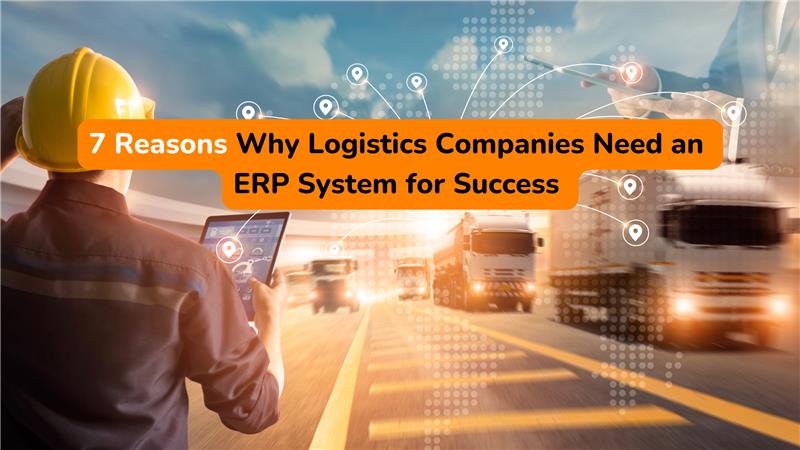Multark - 7 Reasons Why Logistics Companies Need an ERP System for Success
Logistics companies operate in a highly complex, fast-paced environment where efficiency, accuracy, and customer satisfaction are critical to success.

Logistics companies operate in a highly complex, fast-paced environment where efficiency, accuracy, and customer satisfaction are critical to success. To meet these demands, many logistics firms are turning to Enterprise Resource Planning (ERP) systems. ERP software integrates key functions—like inventory, order processing, fleet management, and customer service—into a single platform, streamlining operations and enabling better decision-making. Multark, one of the best ERP system providers for logistics companies in India, offers specialized ERP solutions that help logistics firms improve efficiency, reduce costs, and stay competitive. Here’s why an ERP system is essential for success in the logistics industry.
1. Streamlined Inventory and Warehouse Management
In logistics, efficient inventory management is essential to ensure that the right products are in the right place at the right time. ERP systems provide real-time visibility into inventory levels across multiple warehouses, reducing the chances of stockouts and overstock situations. An ERP system also enables logistics companies to automate inventory tracking and optimize storage, helping streamline operations and improve order fulfillment times. Multark’s ERP solutions offer advanced inventory management tools that allow logistics firms to stay organized, reduce waste, and maintain optimal inventory levels.
2. Enhanced Order Processing and Tracking
ERP systems centralize order processing, providing a unified view of all incoming, ongoing, and completed orders. This transparency allows logistics companies to track orders in real time, update customers on order statuses, and reduce the likelihood of errors or delays. By using an ERP, logistics firms can automate order workflows and ensure that orders are processed accurately and efficiently from start to finish. Multark’s ERP system for logistics simplifies order processing, improving customer satisfaction by offering timely and accurate updates.
3. Optimized Fleet Management
For logistics companies that rely on transportation, fleet management is a critical area where ERP systems can make a difference. ERP software allows firms to monitor fleet performance, schedule maintenance, and track vehicle locations, improving overall fleet efficiency. With real-time data, logistics companies can reduce fuel costs, minimize downtime, and prevent breakdowns. Multark’s ERP solutions include fleet management modules tailored to the logistics industry, providing insights that help businesses maximize fleet productivity and minimize operational costs.
4. Better Customer Service and Communication
Customer satisfaction is vital for logistics companies, as it directly impacts client loyalty and business growth. ERP systems improve customer service by providing a centralized platform for communication and enabling quick access to order information, tracking updates, and delivery times. Multark’s ERP system integrates customer relationship management (CRM) tools, allowing logistics companies to manage client interactions effectively, respond to inquiries promptly, and resolve issues with minimal delays, ultimately leading to better customer satisfaction and retention.
5. Cost Control and Financial Management
Managing finances in logistics can be complex, with numerous variables such as transportation costs, labor expenses, and warehousing fees. ERP systems provide robust financial management tools that allow logistics companies to track expenses, create budgets, and monitor profit margins. By having a centralized view of all financial data, firms can control costs, optimize resource allocation, and make informed financial decisions. Multark’s ERP solutions for logistics come with advanced financial reporting and budgeting features, helping businesses maintain a healthy bottom line.
6. Data-Driven Decision-Making
In logistics, real-time data is crucial for making informed decisions that improve operational efficiency. An ERP system consolidates data from multiple sources, providing a single source of truth for all key metrics. This data centralization enables logistics companies to analyze performance, track KPIs, and identify trends, allowing them to make strategic adjustments quickly. Multark’s ERP solutions offer comprehensive analytics and reporting tools that help logistics firms make data-driven decisions, improve processes, and stay competitive in a dynamic industry.
7. Scalability and Flexibility for Growth
As logistics companies expand, they need systems that can grow with them. ERP systems are highly scalable, allowing businesses to add new functionalities and adapt to changing demands. This flexibility ensures that logistics firms can accommodate increased transaction volumes, new services, and additional locations without major disruptions. Multark’s ERP solutions are designed to be scalable and customizable, enabling logistics companies to adjust their ERP system according to their growth and operational needs.
Conclusion
For logistics companies, an ERP system is more than just a tool—it’s a strategic investment that supports operational efficiency, customer satisfaction, and long-term growth. By streamlining core processes, improving data visibility, and enabling real-time decision-making, ERP systems equip logistics firms with the tools they need to thrive in a competitive landscape. Multark, recognized as the best ERP system provider for logistics companies in India, offers specialized ERP solutions tailored to meet the specific challenges of the logistics industry. With Multark’s ERP system, logistics companies can achieve greater efficiency, enhance customer service, and position themselves for sustainable success in a rapidly evolving market.
Hello Multark Team,
How can we manage vehicle tracking?
Thanks, Hitesh Khale